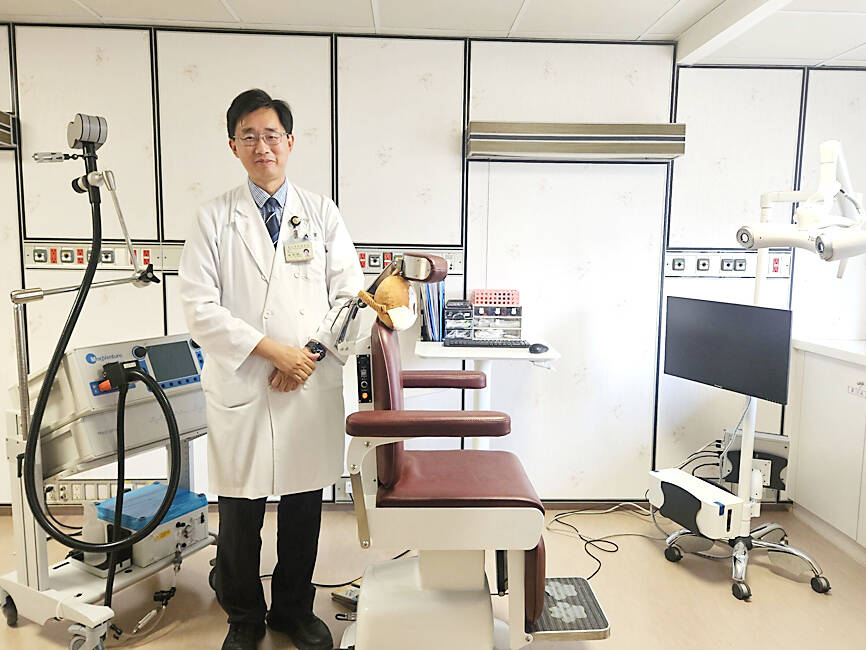Taipei Veterans General Hospital (TVGH) on Wednesday touted the world’s first artificial intelligence (AI)-powered platform designed to assist in the diagnosis of schizophrenia, saying it has an accuracy of 91.7 percent and is capable of transcending the limits of traditional symptom-based assessments.
“The field of psychiatry has long hoped to identify objective biological markers that can help quantify the symptoms [of mental illness],” TVGH Medical AI Development Center deputy director Albert Yang (楊智傑) said.
Due to the lack of objective diagnostic tools, psychiatric evaluations have long relied primarily on clinical observations and subjective interviews, making it difficult for physicians to fully understand a patient’s condition and changes in brain function, Yang said.

Photo: CNA
With that challenge in mind, he led the team that developed BrainProbe, the world’s first AI-powered platform capable of assisting in the diagnosis of schizophrenia, a mental illness linked to neurotransmission abnormalities, and degeneration in brain structure and function.
Based on data from more than 1,500 participants recorded since 2012 — including healthy people and those with schizophrenia — BrainProbe quantified brain abnormalities related to schizophrenia using magnetic resonance imaging scans and deep learning algorithms, Yang said.
Yang cited the case of a 30-year-old who was experiencing auditory hallucinations and paranoid delusions as an example of how the platform aids in the diagnosis of schizophrenia.
“BrainProbe was able to detect signs of degeneration in his brain function and structure — particularly in deeper regions such as the insula and temporal lobe,” Yang said, adding that abnormalities associated with schizophrenia prompted further evaluation, and the man was later confirmed to have the disease.
The most important capability of BrainProbe is its ability to track changes in the brain as it ages, he said.
The platform has established a brain aging prediction index and a mechanism for monitoring pathological changes in brain structure and function, he added.
BrainProbe is still under review by the Food and Drug Administration, but people can access the platform at TVGH on a self-pay basis through a clinical trial program.
Asked about the development of the platform, Yang said his team is collaborating with medical institutions abroad to incorporate data from other populations.
“We hope this platform can be applied across different ethnic groups to enable more accurate research,” he added.

Taiwan has received more than US$70 million in royalties as of the end of last year from developing the F-16V jet as countries worldwide purchase or upgrade to this popular model, government and military officials said on Saturday. Taiwan funded the development of the F-16V jet and ended up the sole investor as other countries withdrew from the program. Now the F-16V is increasingly popular and countries must pay Taiwan a percentage in royalties when they purchase new F-16V aircraft or upgrade older F-16 models. The next five years are expected to be the peak for these royalties, with Taiwan potentially earning

STAY IN YOUR LANE: As the US and Israel attack Iran, the ministry has warned China not to overstep by including Taiwanese citizens in its evacuation orders The Ministry of Foreign Affairs (MOFA) yesterday rebuked a statement by China’s embassy in Israel that it would evacuate Taiwanese holders of Chinese travel documents from Israel amid the latter’s escalating conflict with Iran. Tensions have risen across the Middle East in the wake of US and Israeli airstrikes on Iran beginning Saturday. China subsequently issued an evacuation notice for its citizens. In a news release, the Chinese embassy in Israel said holders of “Taiwan compatriot permits (台胞證)” issued to Taiwanese nationals by Chinese authorities for travel to China — could register for evacuation to Egypt. In Taipei, the ministry yesterday said Taiwan

Taiwan is awaiting official notification from the US regarding the status of the Agreement on Reciprocal Trade (ART) after the US Supreme Court ruled US President Donald Trump's global tariffs unconstitutional. Speaking to reporters before a legislative hearing today, Premier Cho Jung-tai (卓榮泰) said that Taiwan's negotiation team remains focused on ensuring that the bilateral trade deal remains intact despite the legal challenge to Trump's tariff policy. "The US has pledged to notify its trade partners once the subsequent administrative and legal processes are finalized, and that certainly includes Taiwan," Cho said when asked about opposition parties’ doubts that the ART was

If China chose to invade Taiwan tomorrow, it would only have to sever three undersea fiber-optic cable clusters to cause a data blackout, Jason Hsu (許毓仁), a senior fellow at the Hudson Institute and former Chinese Nationalist Party (KMT) legislator, told a US security panel yesterday. In a Taiwan contingency, cable disruption would be one of the earliest preinvasion actions and the signal that escalation had begun, he said, adding that Taiwan’s current cable repair capabilities are insufficient. The US-China Economic and Security Review Commission (USCC) yesterday held a hearing on US-China Competition Under the Sea, with Hsu speaking on